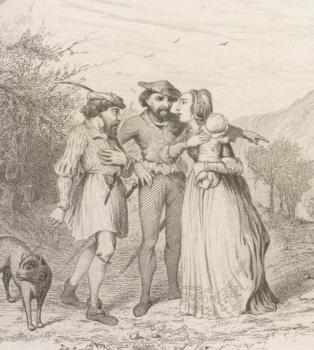27th July 2023
Staff collection, volume XVI (Shelf 40)
4th September 2020
It took four years and several appearances in Court for Thomas Tramallier (III) to force Pierre Carey to hand over papers concerning Thomas' grandfather, Thomas Tramallier Senior's (I) estate. Carey's wife was Thomas (I)'s cousin, the daughter of his uncle, the late William Tramallier, and an heir to her father's estate. William had been appointed Thomas Tramallier (II)'s guardian, and Carey had come into possession of the relevant papers on William's death. Carey was fined several times for non-appearance in Court; the Court had delayed sittings at his request, and grew noticeably exasperated. Eventually, on the 12 February 1719, Carey produced a set of books and documents before them. Thomas (II) had appointed his son to act for him. These documents are listed and bound in a ledger entitled Copie de l'Inventaire de partie des Ecrits de la Succession du Sr Thomas Tramalier. 1715. [Note: the surname is written several ways in various documents: Tramallier, Tramailler, Tramaillier, even Tramalier.]
6th March 2020
Edith Carey notebook.
11th January 2019
Transcribed by De Guérin in one of his black-bound notebooks (Staff): 'Various MSS 1500-1606.'
8th June 2016

A translation of an inquest conducted over several months in 1593 by the Colloque, or Assembly, of Bailiwick Churches. The Puritan ministers and elders had here to deal with a dreadful scandal. This piece had a genuine villain: Pierre Le Roy, known as du Bouillon, a church minister who had escaped the massacres of 1572. Formerly minister of the parish of Baron, in Calvados, he was now a refugee, in charge of the parishes of St Pierre-du-Bois and Torteval. The inquiry is full of the detail of the life of ordinary Guernsey people, who gave evidence to the assembly. Michelle Palot, a maidservant to Madame du Bouillon, the minister's wife, was the subject of continued harassment by du Bouillon. Having a baby out of wedlock was highly frowned upon, the mother usually having to do public penance and the father, once ascertained, jailed for a couple of weeks, and forced to marry the mother or at least support the child; but when Michelle was questioned by the authorities as to who had fathered her baby, she gave them a most unexpected answer.
8th June 2016
1593. Pierre du Bouillon's story unravels as witnesses speak out and brave Michelle Palot refuses to waver. The illustrations are from 'Le Cantique de Geneviève de Brabant' and 'Le vieux Château des Ardennes,' in Chants et chansons populaires de la France, Paris: Garnier Frères, 1854, in the Library collection.
6th January 2016
In Guernsey the authorities could, if they wished, make use of the jehennet, or 'Jenny,' better known as ... the rack. It appears, however, that they preferred strappado. The illustration is from Fox's Book of Martyrs, revised John Malham: London, Thomas Kelly, 1814, in the Library Collection.
31st July 2015
The good citizens of St Martin's are asked to give evidence in this tragic case. Transcribed in the original French by Edith Carey into her notebook, Jehanne Becquet's trial for child murder, with her annotations, it is translated here into modern English. From Sir E MacCulloch's MSS. Livre ès Crimes I 60. Jehanne would have known that it was essential for her to show her baby to witnesses, even if it had been stillborn, but she was unable or unwilling to do so. Make your own mind up about her. Do you agree with the court's verdict?
20th July 2015
Letter to Monsieur de Pontaumont, archivist of the Société académique de Cherbourg.'My dear friend, I am taking the liberty of sending you a copy of a document which you might think appropriate to present to our colleagues at the Society. I feel it provides interesting evidence of the relationship between the people of Alderney and those of Basse-Normandie at the end of the 15th and the beginning of the 16th centuries. It is a document of safe-conduct from the French admiral, Louis Malet, Seigneur de Graville, dated 20 April 1513. We were then at war with England, but, as had long been the case with the people of Alderney, even though they were subjects of the English Crown, they were very keen not to be treated as enemies by French soldiers and sailors.'[The portrait above is of Louis Malet de Graville.]
From Philippe Le Geyt's Manuscripts on the law, constitution, and customs of this island, (that is, Jersey); how you could legitimately be convicted on your reputation.